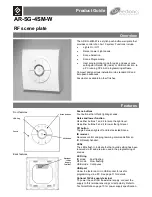
Generic Thermal Solution
R
Intel
®
845GE / 845PE Chipset (G)MCH Thermal Design Guide
21
3.4.1
Flotherm Model Implementation in a System Level Analysis
When integrating the (G)MCH model into a system level analysis, two important issues must be
considered to ensure that the (G)MCH CFD model correctly predicts thermal behavior. These
issues are the proper mating of the model with the motherboard and the thermal solution. Proper
mating requires the following:
•
Ensure that the solder ball cuboid in the chipset model makes direct contact with the
motherboard. Good modeling contact must be specified and the contact should be verified by
closely zooming in on the interface between the solder ball cuboid and the motherboard.
•
Ensure that the die cuboid in the chipset model is properly mated to the thermal solution.
Model the thermal interface material by using a cuboid with the appropriate properties to
account for the thermal resistance in the material and the surface contact. Either a non-
collapsed or a collapsed cuboid may be used to model the thermal interface material as long
as the specified properties of the cuboid remain the same.
System Model Grid
Make sure that a sufficient number of grid cells are used within and around the area of the
package to capture sharp thermal gradients. Note that an increase in the number of grid cells
may also add to the computation time of model.
3.4.3
Thermal Model Power Dissipation
Based on the system component configuration, use the TDP power values shown in Table 5.











































